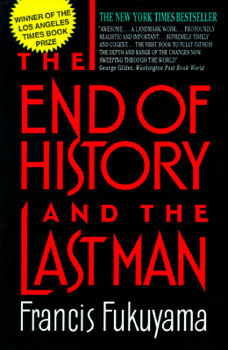The End of History and the Last Man
Select Format
Select Condition 
Book Overview
Ever since its first publication in 1992, the New York Times bestselling The End of History and the Last Man has provoked controversy and debate. "Profoundly realistic and important...supremely timely... This description may be from another edition of this product.
Format:Paperback
Language:English
ISBN:0380720027
ISBN13:9780380720026
Release Date:February 1993
Publisher:Harper Perennial
Length:448 Pages
Weight:0.80 lbs.
Dimensions:1.1" x 5.2" x 8.1"
Customer Reviews
3 ratings
A Misunderstood Masterpiece
Published by Thriftbooks.com User , 21 years ago
After 9-11, it became easy to make fun of "The End of History and The Last Man". The book's title suggested to some a triumphant valedictory for liberal democracy, and yet the epitome of liberal democratic values -- the West -- was now mired in another seemingly endless struggle. Especially for those who never read the work, the phrase "the end of history" became something one only said with scorn. Cynics felt obligated to point out that one more philosophy of the world had fallen into the meat grinder of history, never to be seen again.But this book still has relevance in the post 9-11 world. Despite the vulgarization of its title, Fukuyama did not predict an end to conflict. What's more, he also did not cast the future in an unremittingly optimistic light. In some ways his themes -- particularly in the second half of the book when he focuses on the Nietzschean concept of The Last Man -- are decidedly darker than even keen reviewers of the work have noted. Liberal democracy may have triumphed, but its victory had costs for the collective psyche of its denizens."The End of History and The Last Man" came out in the wake of the fall and breakup of the Soviet Union. With the collapse of global communism, Fukuyama claimed the fundamental values of liberal democracy and market capitalism were now unchallenged. What's more, no other ideologies on the horizon appeared attractive or effective enough to usurp them -- ever. Yes, some countries or regions might fall under the sway of an ideology (Islamic fundamentalism) or a cultural conceit (Asian values), but too much of the globe now accepted that societies should be organized under the principles of liberal democracy and market capitalism for there ever to be a major reversal in its fortunes around the world. Thus, ideological conflict on a global scale was over. And so history -- in the Hegelian sense of the clash of competing ideologies -- was over as well.What kind of man would this post-historical world create? Fukuyama explores this in the second half of the book - a section I feel is neglected by too many readers. Here, Fukuyama shifts his conceptual lens from the philosophy of Hegel and its focus on ideological conflict as the motor of history to the psychological insights of Friedrich Nietzsche. Having used Hegel to show how history might be ending, he now uses Nietzsche to show how empty and meaningless this ending might become. We have reached the end of the history, Fukuyama claims, but Nietzsche shows how unsatisfying that endpoint is. What happens when men are all recognized as equal and the struggle for everything except the accumulation of more material goods is over? What will they value?"The End of History and The Last Man" and its themes will outlast its critics. 9-11 did not restart history, because Islamic fundamentalism does not represent the same serious ideological competitor that was once represented by communism. (It's highly doubtful that even a majority of
Read it, don't abuse what many think it says.
Published by Thriftbooks.com User , 23 years ago
One of the most thought provoking books I have read in a long time. Contrary to the claims of the right, Fukuyama does not conclude that western liberal democray and economic liberalism are the highest form of evolution. He explores this question and in doing so embarks on a fascinating journey though history and political philosophy. There is no airtight conclusion or doctrine being espoused here, which may trouble some. However, the questions raised are critical to understanding modern society, where we have come from and where we may or may not be going. Some have criticized the book for being wordy and repetitive. Though the same themes do appear over and over, they are always to look at new questions. On the contrary, I wish I could have read on.
One of the most important books of this century
Published by Thriftbooks.com User , 26 years ago
Contrary to the common interpretation, Fukuyama, in fact, predicts the implosion of liberal democracy because of its inherent contradiction between liberty and democracy. Liberty encourages differentiation among people, while democracy is predicated on equality. Understanding the implications of this contradiction is critical for all of us living in the end of History.





